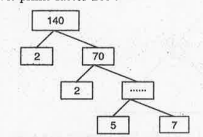Find out which of the following sequences are arithmetic progressions. For those which are arithmetic progressions, find out the common difference. :- a + b, (a + 1) + b, (a + 1) + (b + 1), (a + 2) + (b + 1), (a + 2) + (b + 2)…….Solution in Punjabi
Step by step video & image solution for Find out which of the following sequences are arithmetic progressions. For those which are arithmetic progressions, find out the common difference. :- a + b, (a + 1) + b, (a + 1) + (b + 1), (a + 2) + (b + 1), (a + 2) + (b + 2)……. by Maths experts to help you in doubts & scoring excellent marks in Class 10 exams.
Updated on:21/07/2023Topper's Solved these Questions
Similar Questions
Find out which of the following sequences are arithmetic progressions. For those which are arithmetic progressions, find out the common difference. :- 3,6,12,24,….
View SolutionA bicycle wheel makes 500 revolutions in moving 11 km. Find the diameter of the wheel.
View SolutionComplete the prime factor tree :

View SolutionFind out which of the following sequences are arithmetic progressions. For those which are arithmetic progressions, find out the common difference. 3, 6, 12, 24, (ii) 0, −4, −8, −12, .. (iii) 12,14,16,18,
View SolutionFind out which of the following sequences are arithmetic progressions. For those which are arithmetic progressions, find out the common difference. 12, 2, −8, −18, .. (ii) 3, 3, 3, 3, .. (iii) p, p+90, p+180, p+270, where p=(999)999
View SolutionFind out which of the following sequences are arithmetic progressions. For those which are arithmetic progressions, find out the common difference. a+b, (a+1)+b, (a+1)+(b+1), (a+2)+(b+1), (a+2)+(b+2), .. (ii) 12, 32, 52, 72, . (iii) 12, 52, 72, 73,
View Solution(a) The nth term of a progression is (3n+5). Prove that this progression is an arithmetic progression. Also find its 6th term. (b) The nth term of a progression is (3−4n). Prove that this progression is an arithmetic progression. Also find its common difference. (c) The nth term of a progression is (n2−n+1). Prove that it is not an A.P.
View SolutionIf a,bandc are positive numbers in arithmetic progression and a2,b2andc2 are in geometric progression, then a3,b3andc3 are in
(A) arithmetic progression.
(B) geometric progression.
(C) harmonic progression.
View SolutionIF a,A,b are in Arithmetic progression, then prove that A=a+b2.
View SolutionFind out which of the following sequences are arithmetic progressions. For those which are arithmetic progressions, find out the common difference. 3, 6, 12, 24, (ii) 0, −4, −8, −12, .. (iii) 12,14,16,18,
View SolutionFind out which of the following sequences are arithmetic progressions. For those which are arithmetic progressions, find out the common difference. (i) a+b, (a+1)+b, (a+1)+(b+1), (a+2)+(b+1), (a+2)+(b+2), .. (ii) 12, 32, 52, 72, ... (iii) 12, 52, 72, 73,
View SolutionFind out which of the following sequences are arithmetic progressions. For those which are arithmetic progressions, find out the common difference. :- 3,6,12,24,….
View SolutionFind out which of the following sequences are arithmetic progressions. For those which are arithmetic progressions, find out the common difference. :- 0,-4,-8,-12…..
View SolutionFind out which of the following sequences are arithmetic progressions. For those which are arithmetic progressions, find out the common difference. :- 1/2,1/4 , 1/6 , 1/8 , ……
View SolutionFind out which of the following sequences are arithmetic progressions. For those which are arithmetic progressions, find out the common difference. :- 12, 2,-8,-18,……
View SolutionFind out which of the following sequences are arithmetic progressions. For those which are arithmetic progressions, find out the common difference. :- 3, 3, 3, 3, …….
View Solution
